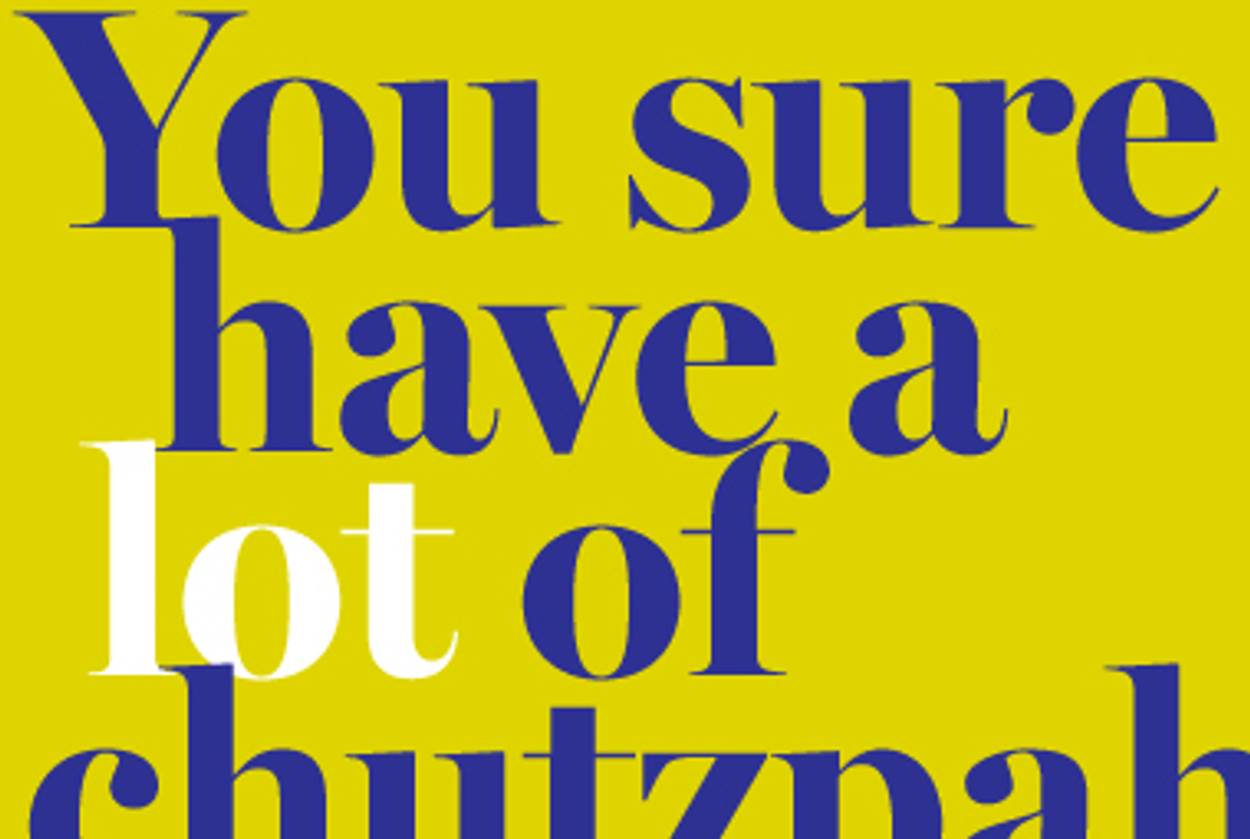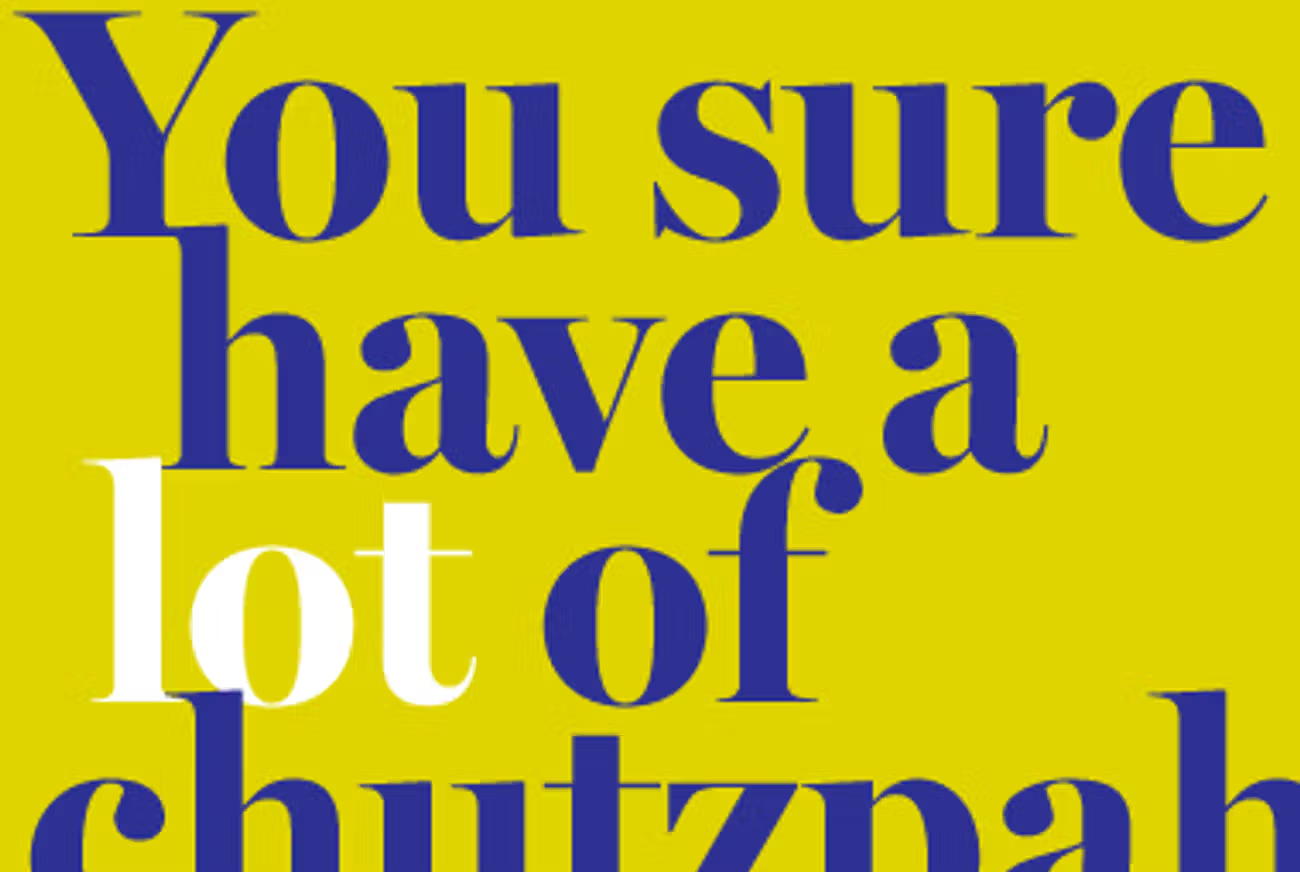The Nerve
The past few months there’s been a rash of chutzpah sightings—that is, lots of public uses of the Yiddish word, if not any more actual chutzpah than usual. The best part: It’s even being used correctly.




More than one commentator criticizing Standard & Poor’s decision to downgrade the U.S. credit rating has accused the agency of chutzpah; a Supreme Court justice wrote a recent dissent describing the petitioners’ argument in a public finance case as an instance of the same quality, and a candidate for the Republican presidential nomination finds so much chutzpah in the incumbent’s behavior that she is impelled to use the word before she’s even learned to pronounce it. The past few months have seen a jump in chutzpah sightings—in public uses of the Yiddish word for nerve or audacity, if not in chutzpah itself, which has become so predictable a feature of public life that it now provokes weary resignation as often as outrage or fury.
Between S&P, Elena Kagan, and Michele Bachmann, “chutzpah” is now ranking higher on Google Trends than at any time since the great spike of 2007, caused by a perfect storm of a Bush aide calling out the Clintons over the Scooter Libby affair and Iranian President Mahmoud Ahmadinejad requesting permission to visit ground zero. Indeed, if Google’s search insights are any indication, “chutzpah” consistently out-performs the “cojones” that are sometimes invoked in its place—and is a runaway winner in Washington. (The main exception was in August 2010, when Sarah Palin, yet another potential president, accused President Barack Obama of having a nether profile more suited to a Ken doll than to a leader, and cojones were “on everybody’s lips,” as CNN’s Jeanne Moos put it.) While more Americans are familiar with Spanish than with Yiddish—a simple Google search yields 12.5 million entries for “cojones,” a mere 2.7 million for “chutzpah”—and more people are thus likely to require an explanation or definition for a use of “chutzpah,” there is a simple reason why neither term should replace the other: Real chutzpah is not the same thing as cojones.
It takes only five letters and a few inches of human anatomy to get from balls to gall, but it’s a distance that makes all the difference in the world. A person might need balls to behave with chutzpah, but those metaphorical balls are only the springboard for the concrete act of chutzpah itself. Balls alone aren’t enough; real chutzpah needs balls, as they’d say in England, that also have some neck on them. None of the writers mentioned above is talking about simple testicular fortitude.
The root meaning of “chutzpah” is “to be insolent or impudent,” and “chutzpah” has come into Yiddish with the same meaning as it has in Hebrew: “impudence, insolence, nerve,” to quote Uriel Weinreich’s Modern English-Yiddish Yiddish-English Dictionary. There’s nothing good about chutzpah in Yiddish; it’s an unambiguously negative quality characterized by a disregard for manners, social conventions, and the feelings and opinions of others. The chutzpahnik’s self-regard and sense of entitlement are so total that he’s unable to see that other people are just as real as he is. (If he’s a she, the chutzpahnik is called a chutzpahnitseh.) Chutzpah comes to your house for dinner and takes a dump in your potted plant; if it goes to its best friend’s funeral and then propositions the bereaved spouse during the shiva, it’s only because there was no chance to do so at the graveside.
Chutzpah shows complete disdain for everyone else’s intelligence; it believes that other people have been put on earth only to do the chutzpahnik’s will and serve as his suckers; sovereign power without a crown, Rashi once called it. Paul Krugman and Ezra Klein were not the only writers to accuse Standard & Poor’s of chutzpah when it downgraded government debt, and I doubt that many readers were surprised when both of them cited what Klein, in his Washington Post blog on August 6, called “the old joke about chutzpah”: a young man murders his parents “and then pleads for leniency because he’s an orphan.” Krugman, in his New York Times column the next day promoted Klein’s joke to illustrative anecdote and said that “chutzpah” is “traditionally defined by the example of the young man who kills his parents,” and so on.
Krugman and Klein are falling back on Jewish tradition, a tradition reaching back through through punk, way beyond disco, all the way to 1968 and the first flowering of Rowan and Martin’s Laugh-In, when Leo Rosten, long famous as the author of The Education of Hyman Kaplan, presented the same story in The Joys of Yiddish as “the classic definition of chutzpa [sic].” So far as I’m aware, Rosten was the first to link this story to the notion of chutzpah; rather than quote a classic definition, he quietly created one by adapting a little-known text to the needs of the moment. Neither Talmudic, midrashic, nor even vaguely rabbinic, Rosten’s source tells the story of a 14-year-old boy “who deliberately murdered his father and mother in cold blood with a meat-axe.” He’s found guilty by a jury, and the judge asks him if he has anything to say before sentencing. The boy replies, “Why no … I think I haven’t, though I hope yer Honor will show some consideration FOR THE FEELINGS OF A POOR ORPHAN” (the capital letters are Ward’s).
Rosten’s source is set in Arkansas, not Warsaw; Rosten calls it classic because he’s borrowed it from the work of Artemus Ward, whom Mark Twain called “America’s greatest humorist.” Ward died in 1867 and probably never heard the word “chutzpah” in his life. Rosten’s definition is classic, all right, classic American humor that he circumcised into a piece of traditional Jewish lore without mentioning Ward’s name even once. Chutzpah is as chutzpah does—it’s as American as apple pie or Spanish balls.
Rosten doesn’t quote Ward’s final sentence, in which “the perfect young wretch” is sentenced, presumably to death, but Ward had managed to catch the dismay that typifies the usual Yiddish reaction to instances of chutzpah. The common English-language use of the term to denote an admirable display of nerve, courage, or independence of spirit in the face of outmoded, inefficient, or unimaginative ways of doing things—chutzpah as cojones—isn’t shared with any Jewish languages. Although Rabbi Nachman tells us the Babylonian Talmud says “chutzpah pays, even against heaven,” he’s generally thought to be speaking ironically; he’s talking about Balaam, who manages to get God to grant him permission to go off with representatives of the Moabite king to curse the Israelites. When it comes time to do the cursing, though, God puts a blessing into Balaam’s mouth, and Balak, the king of Moab, refuses to fork over the fee Balaam had been promised—some pay-off.
When a classical Hebrew text uses “chutzpah” to mean “cojones”—courage, guts, gumption—it does so only ironically. A midrash about the binding of Isaac has Isaac tell Abraham to tie down his hands and feet because “the life-force is full of chutzpah,” not easily vanquished or discouraged; that is, the life force never says die until it’s already dead. According to the Jerusalem Talmud, “Rabbi Ze’era said, Come and see what chutzpah the land of Israel has, that it produces fruit”—in spite of all the devastation that it has undergone.
The irony at play in the Talmud reaches its fullest development in Yiddish. If someone were to say that Alexander the Great showed plenty of chutzpah when he cut through the Gordian knot instead of trying to untie it, that someone would be adopting the view of Alexander’s competitors and opponents; as far as Alexander and his supporters were concerned, Alexander did the smart thing. Likewise, if we say that Rosa Parks showed plenty of chutzpah when she refused to give up her seat on that Montgomery bus, we use the racist point of view to mock the racist idea that Parks had the unmitigated gall to behave as if—can you believe it?—she were white. English-speakers unaware of the irony underlying such uses of “chutzpah” in Yiddish or Yiddish-influenced English simply ascribed a new, highly positive meaning to the term.
It probably says something depressing about the state of public life today that the only such ironic, “positive” use of “chutzpah” that I’ve noticed in all the recent flurry is a piece on ESPN.com about Seattle Mariners’ right fielder, Ichiro Suzuki, whose chutzpah seems to lie in his insistence on acting like Ichiro, even in the face of a recent slump. I don’t know if Johnette Howard, the article’s author, speaks any Yiddish, but she certainly knows how to tweak a chutzpah.
Howard aside, this sudden upswing in the fortunes of classic chutzpah might well be a sign of good—possibly even rapturously good—things to come. On the last page of tractate Sotah we are told that “in the days immediately preceding the advent of the Messiah, chutzpah will increase.” I’m going to start looking for a frum guy’s face on every taco and Pop-Tart I eat.
Michael Wex’s most recent book, a novel, is The Frumkiss Family Business.
Michael Wex’s most recent book, a novel, is The Frumkiss Family Business.